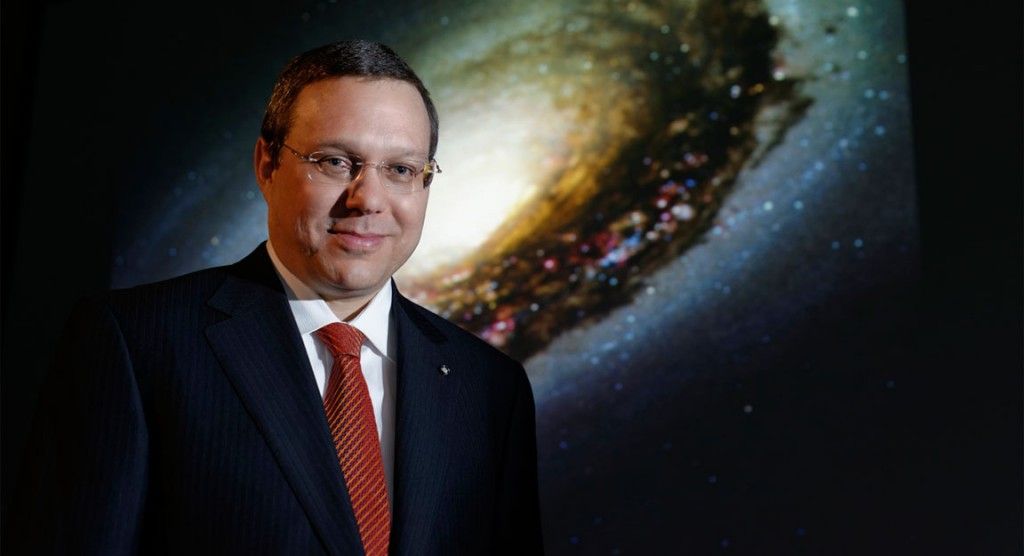Harvard Astronomer Stands By His Alien Theory
by Dugan Arnett April 3, 2019 (bostonglobe.com)
• ‘Oumuamua’, a mysterious celestial object that hurtled close to the Earth in 2017, is the first known object to come here from outside the solar system. Rob Weryk, the person who initially spotted Oumuamua at the University of Hawaii, says that there isn’t “any reason to believe that it’s anything but a natural object.”
• But Professor Abraham ‘Avi’ Loeb (pictured above) of Harvard’s Center for Astrophysics noted that the object did not behave like a typical comet or asteroid. If it were a comet, Loeb said, its excess acceleration would have likely been apparent in the form of a tail of dust or gas. Also, its elongated shape is unlike any asteroid or comet observed before. Loeb said he is simply using the available data to draw an evidence-based conclusion. “Let’s put all the possibilities on the table,” Loeb said. Perhaps, Loeb reasoned, the object had been an artificial object sent from an extraterrestrial civilization. “If someone would show me clear evidence that it’s natural in origin, then I would admit it and move on,” he said.
• Loeb’s speculation has drawn the ire of the scientific community. Astrophysicists from across the country have spoken out against Loeb’s theory, painting him as a sensationalist and worse. Some think that Loeb’s assertions will damage the field’s long-term credibility. “[P]eople think that astronomers are just hunting for aliens,” said Paul M. Sutter, astrophysicist at Ohio State University. “The next time we go out to Congress or the public asking for money, there’s going to be a lot of people shaking their heads saying, ‘Oh, you guys are just nutballs.’”
• But Loeb has refused to back down, digging in his heels against what he considers unjust appraisal. His work, he insists, is not the result of some half-baked sci-fi fantasy. The researchers whose opinions Loeb does value have offered support for the idea — even if they’ve been wary of putting their names to it publicly. Loeb argues that scientific study has become far too conservative — avoiding controversial or unpopular examinations in favor of safer subjects that might earn a scientist an award or induction into a prestigious society, but are not necessarily conducive to substantial scientific advances.
• Irwin Shapiro, the former longtime director of the Harvard-Smithsonian Center for Astrophysics, called Loeb “brilliant.” Stephen Hawking once dined at his home. In 2012, Loeb was named one of the 25 most influential people in space by Time Magazine.
• Loeb was raised in an Israeli farming village. He passed his days reading philosophy books and writing notes to himself. He didn’t move into the field of astrophysics until the age of 26. “The reason I’m different from my colleagues,” he said, “is because I was different from the beginning.”
• In spite of the backlash, Loeb has been happy to field calls from media outlets across the world, and is close to signing a deal for a book on ‘Oumauamua’. Seven different filmmakers have reached to him out about the possibility of doing a film.
Like a lot of people, Avi Loeb, the chairman of Harvard University’s renowned astronomy department, does his best thinking in the shower.
It’s where he has hatched ideas for papers on black holes and the future of the universe, and where, last year, he spent some time pondering a notion that would eventually make him — in some circles, at least — the subject of considerable ridicule.

He’d been thinking about the phenomenon of ‘Oumuamua, a mysterious object that hurtled close to the Earth in 2017. It had become an instant sensation in the scientific community, the first known object from outside the solar system, and astronomers and astrophysicists had jumped to analyze and explain the anomalous object. Theories were developed. Papers were published.
Loeb had a theory, too, and late last year, he detailed it, along with co-author and postdoctoral researcher Shmuel Bialy, in an article for The Astrophysical Journal Letters. Perhaps, he reasoned, the structure had been an artificial object sent from an extraterrestrial civilization.
Almost immediately, the piece ignited the kind of firestorm rarely, if ever, seen in the buttoned-down world of modern-day astronomy.
In the months since the paper’s publication, astrophysicists from across the country have spoken out against Loeb’s theory, painting him as a sensationalist and worse. The researcher who first discovered ‘Oumuamua — Hawaiian for “messenger from afar arriving first” — via telescope has called Loeb’s suggestions “wild speculation.” Another compared Loeb’s logic to that of flat-earthers.
But even as criticism has continued to pour in, Loeb — who is short and slight and wears a near-constant half-smile — has refused to back down, digging in his heels against what he considers unjust appraisal.
He has brushed off much of the negative feedback as the jealous or prejudiced grumblings of scientists he doesn’t respect, adding that the researchers whose opinions he does value have offered support for the idea — even if they’ve been wary of putting their names to it publicly.
FAIR USE NOTICE: This page contains copyrighted material the use of which has not been specifically authorized by the copyright owner. ExoNews.org distributes this material for the purpose of news reporting, educational research, comment and criticism, constituting Fair Use under 17 U.S.C § 107. Please contact the Editor at ExoNews with any copyright issue.
